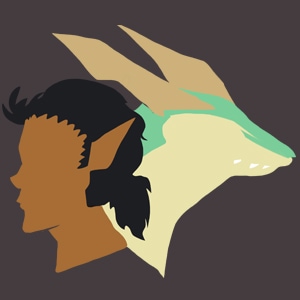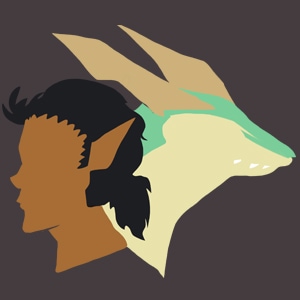Around a century prior to the present day, an enterprising merchant had set out on a lengthy expedition from the West. It was his hope to establish a trade route from the Human kingdom of Earthenstar, across the Tavan Strait and the Nahreeni desert into the Southern Jungles. A largely unexplored region of the world, he desired to lay its hidden riches bare – gemstones, foodstuffs, even tropical lumber - and bring them to the civilised world.
It was a long and arduous task, but before long his caravan company found themselves making the discoveries they had anticipated. On the return trip they first arrived in Nahreen, touting a wide selection of strange wares that was quickly thinned. Though no-one knew at that time, the most important among them by far was a conspicuously-large egg that one of his employees had found in a swamp, after falling off his horse.
Purchased as a curiosity by a daughter of the noble house Al-Zaeas, it soon thereafter hatched amidst a menagerie of pets and domesticated animals. However, what pushed itself from the confines of the shell was not the issue of some giant bird or a snake, as many had guessed - but a tiny, reptilian infant. The egg had been laid by one of the Gardu – the reclusive and legendary lizard-folk – and the mire had in truth been a spawning glen.
Yet, far from being concerned about the creature’s upheaval or even disappointed with their purchase, the Al-Zaeas family had bought for themselves something far more valuable than another denizen of their zoo: a new and fashionably-exotic slave.
Spurred by the City’s unscrupulous treatment of non-Elves, a mistake became a trend, and a trend quickly became a trade. Commoditised, Gardu were snatched from glens all over the jungle and sold to their masters from hatchlings, different colours and patterns commanding different prices. Trained from birth, servitude became the only life these creatures knew.
This was not to say that Gardu slaves were poorly treated – for their foreign beauty they were lavished upon by a doting elite, an essential ‘accessory’ for any household worth their name. They were given personal quarters, fed well, even given days of leave and relaxation by more liberal owners. Generally, they were kept better than free Elven servants had ever been.
Of course, no matter how gilded the bars, they were prisoners - their lives ultimately beholden to someone else.











Comments (0)
See all